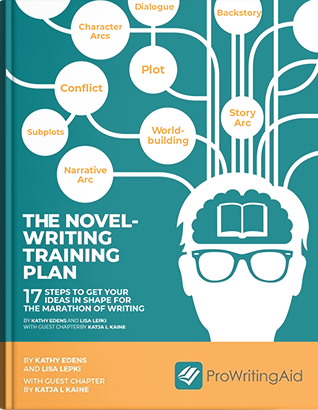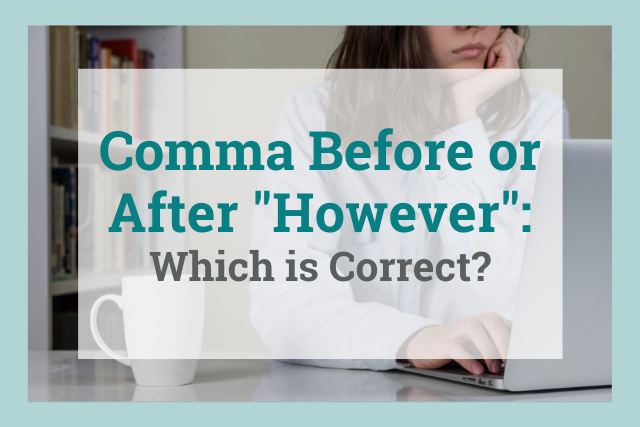
Here’s the definitive answer to the question of when to use a comma before however: sometimes.
Here’s the definitive answer to the question of whether to use a comma after however: it depends.
Grammar and punctuation have lots of rules—lots of very specific rules with so many exceptions and conditions that trying to understand them can feel like trying to unravel a tangled ball of string. The rules for punctuating "however" are part of that ball, but fortunately, they aren’t too difficult to untangle.
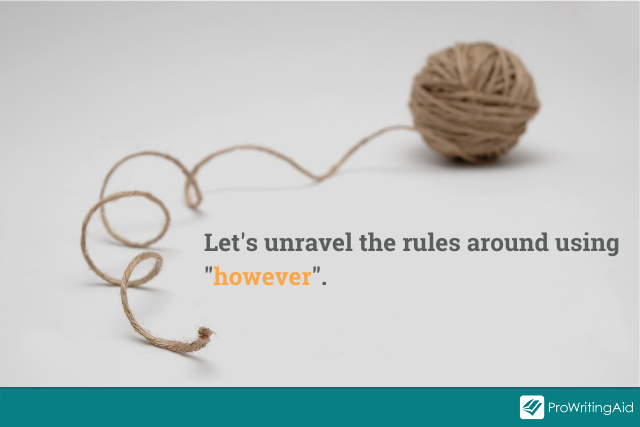
- Do You Need a Comma When Using However as a Conjunctive Adverb?
- Do You Need a Comma When Using However as an Adverb or Conjunction?
- Do You Need a Comma When Using However as an Aside, Interrupter, or Parenthesis?
- Do You Need a Comma When Using However in Interrogative Sentences?
- However and ProWritingAid
- Quick Tips: Using However in Your Writing
Do You Need a Comma When Using However as a Conjunctive Adverb?
As a conjunctive adverb, however is used to join two independent clauses to form a compound sentence. An independent clause is a clause that could stand alone as a complete sentence. The “however” introduces a contrast or opposition between two independent clauses.
Think of it as meaning in contrast, on the other hand, or but. When you use however this way, one option is to put a semicolon before and a comma after the however:
- The car was beautiful; however, it was extremely fuel-inefficient.
- The salad was full of delicious vegetables; however, it was underdressed.
If you don’t love semicolons, a second option is to put a period at the end of the first clause. Then, capitalize however and keep the comma after it:
- The car was beautiful. However, it was extremely fuel-inefficient.
- The salad was full of delicious vegetables. However, it was underdressed.
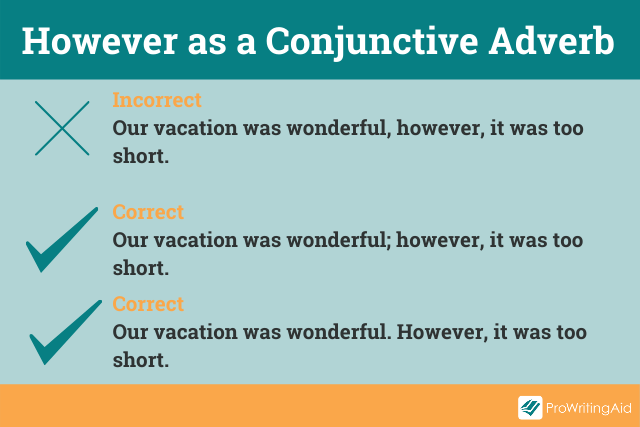
Punctuation and grammar rules state that two independent clauses connected with a conjunctive adverb cannot be joined with only a comma. The semicolon is strong enough to hold them together, and the full stop of the period is powerful enough to break the clauses apart.
Incorrect: Our vacation was wonderful, however, it was too short.
Correct: Our vacation was wonderful; however, it was too short.
Correct: Our vacation was wonderful. However, it was too short.
Though some writers rebel against this rule and surround their conjunctive adverbs with commas, most still prefer the significant pause the semicolon or period offers.
Do You Need a Comma When Using However as an Adverb or Conjunction?
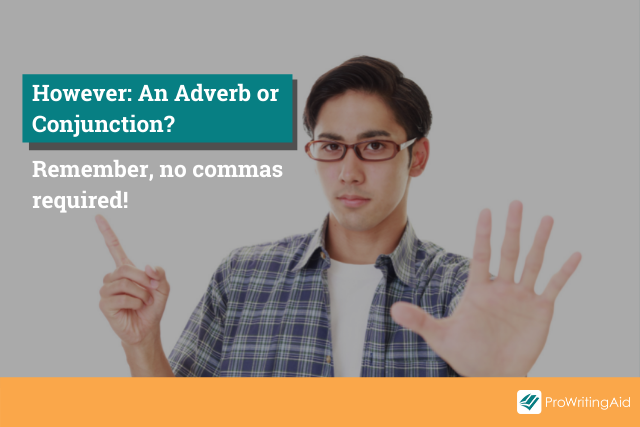
When you’re using however either as a conjunction or an adverb, it doesn’t require commas. Let’s take a look at some examples within three different categories of meaning.
1. Using However to Mean No Matter How, In Whatever Way, or In Whatever Manner
- However you manipulate those numbers, they just don’t add up. (adverb)
- The numbers don’t add up however you manipulate them. (adverb)
- However you look at them, these results are a disaster. (adverb)
- These results are a disaster however you look at them. (adverb)
- I’ll give you help however you need it. (conjunction)
- Eat the food however they serve it. (conjunction)
2. Using However to Mean To Whatever Extent or Degree
- He loves that dog so much, he’ll find a way to keep it however much his roommate complains. (adverb)
- However sad she feels now, she’ll be happy tomorrow. (adverb)
3. Using However to Mean By Whatever Means
- They don’t care however you get it. They just want their money. (adverb)
- However you do it, get the job done fast! (adverb)
Do You Need a Comma When Using However as an Aside, Interrupter, or Parenthesis?
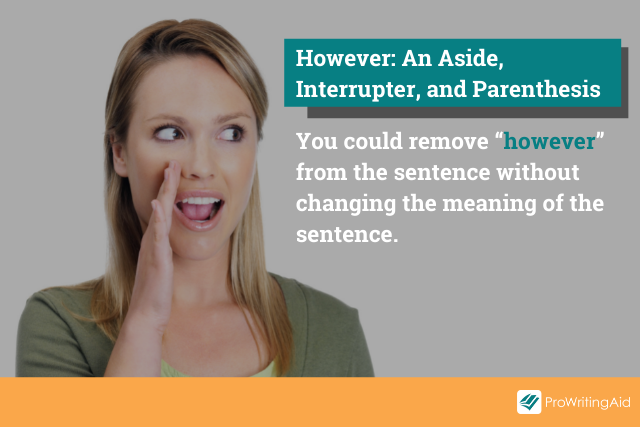
Aside, interrupter, and parenthesis are interchangeable terms in this grammatical context. They all indicate the use of however as a word that shows contrast (most closely, though), but in these cases, the word is not an essential part of the sentence. Simply stated, you could remove however from the sentence without changing the meaning of the sentence.
So what about commas?
If you use it as an aside in the middle of your sentence, put a comma before and after however. For example:
- My baby’s due date is in three weeks. My mother, however, is convinced I’ll give birth early.
- Pat is excited for the first day of school. Chris, however, is not.
- The ocean waves were so much fun. The seaweed, however, was another story.
If you use it as an aside at the end of a sentence, put a comma before however and a period after it. For example:
- I’ll be attending the holiday party. My partner will not, however.
- The driving test will be easy. You will have to practice, however.
- They made quite a bit of money. They wasted most of it, however.
Do You Need a Comma When Using However in Interrogative Sentences?
Finally, you can use however at the beginning of an interrogative sentence (a question) when you’re expressing surprise or wonder. In this case, however translates to How in the world …? and is a less common use of the word. For example:
- However did you locate him?
- However will we feed so many people?
- However were you able to forgive them?
However and ProWritingAid
While there are a variety of good ways to use however in your writing, overuse or misuse of any word can distract your reader. Use the ProWritingAid All Repeats Report to ensure your work isn’t overloaded with howevers, and the Grammar Report to confirm you’ve used it correctly.
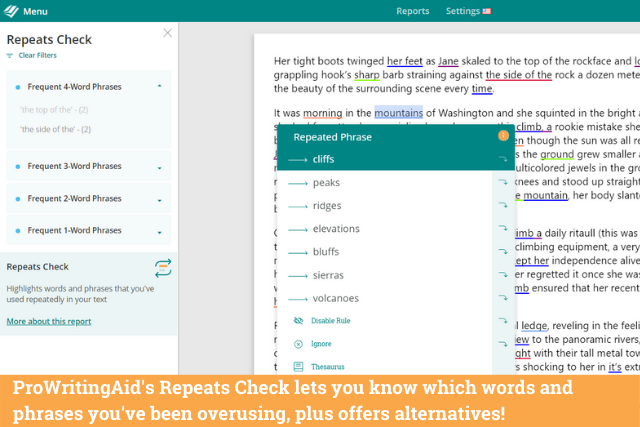
Quick Tips: Using However in Your Writing
Here’s a quick reference list to help you keep that ball of rules and conditions neat and untangled, at least when it comes to using however in your writing.
However at the Beginning of a Sentence
Put a comma after however if you’re using it as a conjunctive adverb to introduce a contrast, and it is followed by an independent clause (a clause that could be used as a complete sentence).
- The sun was shining brightly. However, the day was cold and windy.
- He was predicted to win the election. However, the underdog won in the recount!
TIP: Some other common conjunctive adverbs that require this punctuation pattern include furthermore, moreover, consequently, additionally, and therefore.
Do not put a comma after however if it is part of a dependent clause (a clause which cannot stand as a complete sentence) and means no matter how or in whatever way or in whatever manner. Put the comma at the end of that dependent clause.
- However nervous you are, you’ve still got to perform.
- However you look at it, I owe him a debt of gratitude.
Do not put a comma after however if you are using it to start an interrogative sentence.
- However will we get write this report?
- However did you get into this situation?
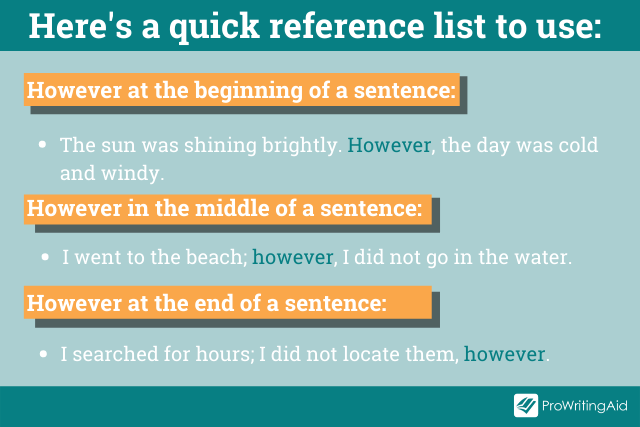
However in the Middle of a Sentence
Put a semicolon before and a comma after however if you’re using it to join two complete sentences.
- I went to the beach; however, I did not go in the water.
- The team played well; however, the other team played even better.
Do not put any punctuation before or after however if you’re using it to mean:
- No matter how: You’ve got to perform however nervous you may be.
- In whatever way/manner: I owe him a debt however you look at it. Get it done however you wish.
- To whatever extent: Call me tonight however late it is.
- By whatever means: Locate them however you need to.
- No matter how: You’ve got to perform however nervous you may be.
Surround however with commas if you’re using it as an interrupter or aside:
- The house is lovely. It is, however, quite small.
- Rules of grammar and punctuation can be complicated. To write well, however, it’s important to understand them.
- The house is lovely. It is, however, quite small.
TIP: Using however (or other conjunctive adverbs) this way also serves to add emphasis to your comments.
However at the End of a Sentence
Put a comma before and a period after however when you use it at the end of a sentence.
- I searched for hours. I did not locate them, however.
- The baby was hungry. He just couldn’t settle down enough to eat, however.
And there you have it. However you use it, you’ve got however and the punctuation that accompanies it under control!

